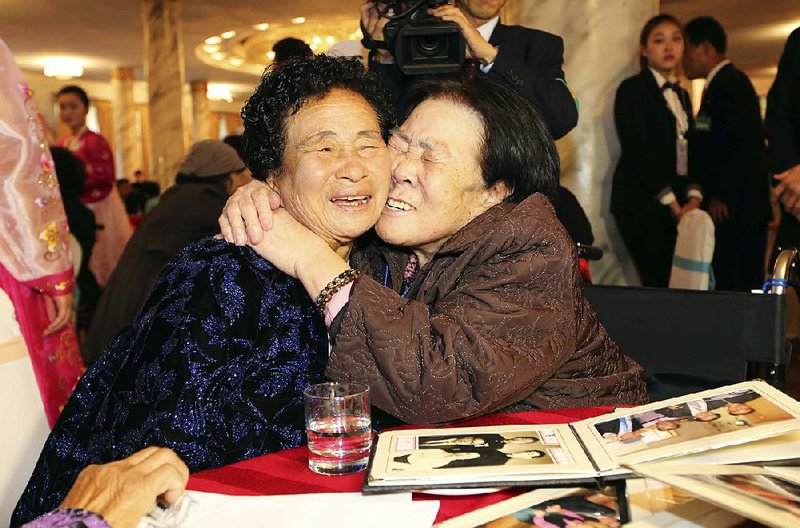SEOUL, South Korea -- A 98-year-old South Korean man cried loudly and repeatedly buried his face in a handkerchief as his North Korean son, who last saw his father as a 5-year-old, watched calmly from across the table.
Meanwhile, an 88-year-old South Korean woman sobbed uncontrollably as she embraced her crying 64-year-old son, who Seoul says was abducted by the North in 1972.
And two elderly North Korean women knelt and bowed to their 98-year-old South Korean father, who brought with him red, flower-patterned shoes he had promised his daughters 65 years ago.
Such scenes created a wave of emotions Saturday at North Korea's scenic Diamond Mountain resort, where the rival Koreas began the second and last of a round of reunions of families separated since the 1950-53 Korean War.
About 250 South Koreans, including more than 30 over the age of 90, arrived at the resort hours earlier for three-day meetings with 190 of their North Korean relatives, whom most hadn't heard from for more than 60 years.
In the first round of reunions lastweek, about 390 South Koreans traveled to the resort to meet with 180 North Korean relatives.
For many participants from both countries, their first meeting after decades of separation will likely be their last, considering their age. Most of the South Koreans traveled to the North by bus on Saturday, but at least two were taken by ambulance because of their fragile health.
"I remember seeing you as a baby, but you are so old now," a sobbing Lee Seok-ju, 98, told his 70-year-old North Korean son, Ri Dong Wuk, whom he left behind in 1950 as he fled to the South to avoid being mobilized for the North Korean army.
Ri constantly smiled and spoke softly to his father, showing him several family photos and explaining to him what happened to the family members he left in the North.
South Korea's government says North Korean Jong Kun Mok was one of more than 20 crew members of two South Korean fishing vessels who were abducted by the North in 1972 while trawling near the western sea border between the countries. One of the fishermen managed to escape from the North and returned to South Korea in 2013.
Seoul believes that about 500 South Koreans have been abducted by the North since the end of the war and says it has lost track of most of them.
The North denies abducting South Koreans, but it has allowed some individuals Seoul says were kidnapped to meet their relatives in reunions.
As soon as he saw Lee Bok-soon, Jong shouted "Mother!" and rushed to embrace her. Lee, sitting in a wheelchair, wept and touched her son's face while she struggled to find words.
"I am glad that you are alive, Mother," Jong later said, before introducing Lee to his North Korean wife.
The highly emotional reunions, which are held irregularly between the rivals, double as a reminder that the Korean Peninsula is still in a technical state of war because the Korean War ended with an armistice, not a peace treaty.
Before the current reunions, about 18,800 Koreans had participated in 19 face-to-face reunions held between the countries since 2000. Both Koreas ban ordinary citizens from visiting relatives on the other side of the border or contacting them without permission.
South Korea uses a computerized lottery system to pick participants for the reunions, while North Korea reportedly chooses based on loyalty to its authoritarian leadership.
Nearly half of the 130,410 South Koreans who have applied to attend a reunion have died. None of the past participants has had a second reunion.
South Korean analysts say authoritarian North Korea allows only infrequent reunions for fear of losing an important bargaining chip for its efforts to win badly needed aid and concessions. Analysts believe Pyongyang also worries that its citizens will become influenced by the more affluent South, which could loosen the government's grip on power.
A Section on 10/25/2015
